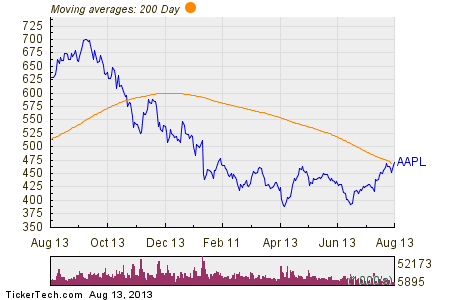Apple, Inc. shares cross above 200 day moving average
Shares in Apple, Inc. have crossed above their 200 day moving average for the first time since plunging below the key indicator last fall.
Source: Forbes
Additionally, "activist investor" Carl Icahn has since reported having a "large position" in Apple, calling it in "extremely undervalued" in a tweet, and following up with advice for Apple's chief executive to buy back even more of the company's own stock.
We currently have a large position in APPLE. We believe the company to be extremely undervalued. Spoke to Tim Cook today. More to come.
— Carl Icahn (@Carl_C_Icahn) August 13, 2013
A longer term trend upward
A "200 day moving average" provides a smoothed out trajectory of a share's recent prices, calculated by looking at its average price over a little more than the last six months.
The indicator is used by investors to visualize overall trends, without the distraction of day to day "noise" and short term irrationality of the market. The news was reported by DividendChannel.com via Forbes, which plotted the moving average trend against recent share prices (above).
Over the previous week, Apple's share prices spiked upward on Monday after the news of the Obama administration vetoing the International Trade Commission's import ban, and again jolted upward after the ITC approved an import ban against some Samsung models and after news leaked of an earlier than expected iPhone release.
In between the two Mondays, however, investor profit-taking and other factors erased the initial short term gain.
AppleInsider only describes correlations between an event and a stock's price change as just a possible contributing factor, and does not provide any recommendations or advice related to stock transactions in the extremely volatile and often irrationally unpredictable market. It's generally impossible to associate a precise correlation between stock price changes and a particular event.
It's generally impossible to associate a precise correlation between stock price changes and a particular event. Over a longer term, a moving average can provide a stronger indicator of where a stock is heading, however, and is watched closely by many investors.
After peaking above $700 in mid September last year, Apple shares continued a downward trend that only began to flatten out in the second calendar quarter of 2013. As the stock recovered and then gave back gains, the moving average continued to decline.
Apple's shares today reached above $475, crossing their 200 day moving average of $471. That figure has been dropping along with Apple's price decline, showing a rear view mirror look at where the stock has been trending. [Update: following Icahn's tweet the stock closed today at $489.57.]
Upward trend may be spurred by iPhone release date
Continued upward movement by Apple shares over the last two days may reflect investors' increasing realization of the strategic importance of Apple's rumored iPhone event date, reported by Ina Fried of Wall Street Journal to occur September 10.Continued upward movement by Apple shares over the last two days may reflect investors' increasing realization of the strategic importance of Apple's rumored iPhone event date.
The reported date occurs at the end of the IFA Berlin trade show, promising to distract from new product releases planned by Samsung and possibly HTC, the same way Apple's historical Macworld Expo events regularly sucked the excitement from the Las Vegas Consumer Electronics Shows headlined by Microsoft.
At the same time, and likely of even greater importance, an earlier than expected release of new iPhones and iOS 7 on September 10 would potentially provide Apple with three full weekends affording either or both presale and launch sales within the fall quarter.
A later iPhone launch in October would shift those critical sales into the winter quarter, providing market research firms with another relatively slow quarter to browbeat the company over its supposed dearth of innovation and purported inability to release new devices during seasonally slow sales quarters.
Release cycles coordinated with peak sales
Samsung recently launched its flagship Galaxy S 4 smartphone and Galaxy Note 8 tablet in the spring quarter ending in June, but then reported a significant drop in sequential tablet sales and no discernible positive impact on the company's reported profits.
In contrast, Apple pulled out of the Macworld Expo after January 2009, noting at the time that "trade shows have become a very minor part of how Apple reaches its customers," but also indicating that the January timing of the event didn't fit into its actual sales cycles.
The company has increasingly worked to adjust the release its new consumer products to occur immediately before peak holiday sales, similar to the launch timing of similarly cyclical video game consoles from Microsoft, Nintendo and Sony. Last year, Apple overhauled nearly its entire product lineup for the holiday quarter.
The aggressive move involved a rushed release of Apple's thin new iMac, which ended up being delayed until deep into November and December, resulting in Apple's chief executive Tim Cook later admitting, "In retrospect, yes, I sort of wish we had done it after the turn of the year. Customers wouldn't have had to have waited as long as they did."
 Daniel Eran Dilger
Daniel Eran Dilger













 Chip Loder
Chip Loder
 Andrew Orr
Andrew Orr
 Marko Zivkovic
Marko Zivkovic
 David Schloss
David Schloss

 Malcolm Owen
Malcolm Owen

 William Gallagher
William Gallagher







